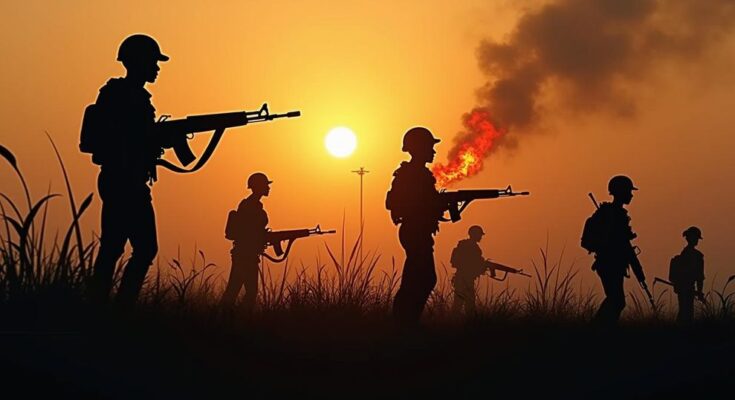Human Rights Watch has released a report detailing civilian atrocities in the eastern Democratic Republic of the Congo amid military confrontations involving Rwandan forces and the M23 rebel group. Key allegations include widespread violence against civilians, unlawful detentions, sexual violence, and child soldier recruitment. HRW calls for investigations, accountability, and humanitarian assistance, highlighting the urgent need for protective measures and international oversight.
On Thursday, Human Rights Watch (HRW) presented a report highlighting egregious civilian violations in the eastern Democratic Republic of the Congo (DRC) amid ongoing military confrontations involving Rwandan forces and the M23 militant group. As hostilities escalate near the town of Sake, local populations and over half a million displaced individuals face heightened risks of violence and humanitarian crises. The M23, an armed militia predominantly comprised of Tutsis and supported by Rwanda, has resumed its insurgent activities since 2021. Allegations against the group include widespread civilian atrocities, such as indiscriminate attacks, sexual violence, and the coercion of child soldiers into their ranks. The situation is further exacerbated by Rwanda’s alleged backing of M23, despite repeated calls from the international community for peace negotiations. Within North Kivu, where conflict remains concentrated, displacement camps surrounding Goma have become critical points of violence and distress. The Shabindu-Kashaka displacement site, located in North Kivu, has been among those severely affected by the ongoing hostilities. In early April, military rockets launched by Rwandan troops and M23 targeted this location, resulting in the death of a 19-year-old and significant destruction of sheltering accommodations. Additional rocket strikes on May 3 affected the Lac Vert and Mugunga neighborhoods, leading to at least 17 civilian fatalities, including the loss of 15 children. HRW has drawn attention to the dire humanitarian conditions in the Kanyaruchinya camp, where unlawful detentions and extortion by Wazalendo fighters have been reported. Detainees are subjected to conditions in makeshift holding areas known as “kiboro”, with survivors recounting experiences of violence and abuse. A disturbing rise in sexual violence has been noted, with survivors reporting that their assailants often wore military uniforms. The frequency of these assaults, with reports indicating between 50 and 100 cases weekly in specific camps, underscores the urgent need for protective measures, as sexual violence in conflict is considered a war crime. The actions documented in HRW’s report could infringe upon international humanitarian law, particularly the Fourth Geneva Convention, which is intended to protect civilians during warfare. Unlawful detentions and extortion activities may also qualify as war crimes under the Rome Statute of the International Criminal Court. HRW has urged the authorities in both Congo and Rwanda to conduct thorough investigations and to prosecute those responsible for war crimes, particularly cases involving sexual violence, adhering to the principle of command responsibility. The organization advocates for comprehensive humanitarian aid for all affected civilians, incorporating legal, social, and medical support for survivors of sexual violence. Moreover, HRW has urged both governments to endorse the 2022 Political Declaration on Strengthening the Protection of Civilians from the Humanitarian Consequences Arising from the Use of Explosive Weapons in Populated Areas, highlighting the necessity of enhanced civilian protections against the devastating impacts of explosive armaments. Finally, HRW emphasizes the importance of oversight by the UN, EU, and other international bodies on military assistance to ensure that it does not contribute to further abuses while consistently upholding human rights standards.
The ongoing conflict in the Democratic Republic of the Congo (DRC) has its roots in a complex interplay of historical ethnic tensions and regional dynamics, particularly involving Rwanda. The resurgence of the M23 rebel group in 2021 has sparked renewed violence in the eastern DRC, particularly in North Kivu Province. This area has become a refuge for various armed groups and remains a battleground for competing interests, leading to significant civilian suffering. Many people have been displaced due to the violence, facing dire humanitarian conditions and escalating risks of human rights violations. Reports have surfaced regarding the complicity of foreign powers, particularly Rwanda, which has been accused of supporting such groups, thereby complicating peace efforts and exacerbating the humanitarian crisis.
In conclusion, the HRW report sheds light on the severe human rights abuses occurring in the eastern DRC, underscoring the urgent need for accountability and humanitarian intervention. The allegations against the Rwandan forces and M23 rebels highlight a pressing challenge to international humanitarian law and the protection of civilians. The international community must respond proactively to these violations to safeguard the rights and lives of the affected populations. Comprehensive investigative and protective actions are paramount in addressing the ongoing crisis, offering crucial support for survivors, and fostering long-term peace in the region.
Original Source: www.jurist.org




